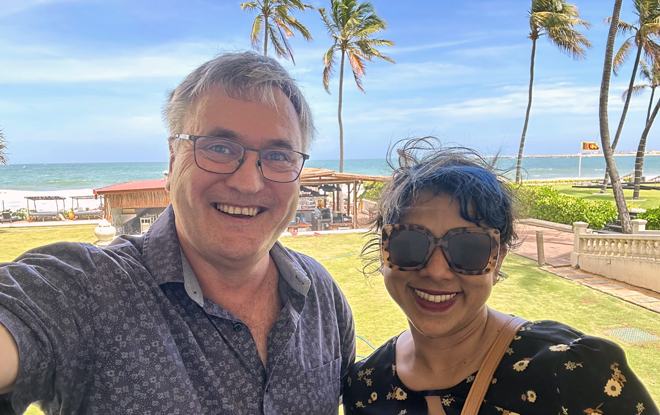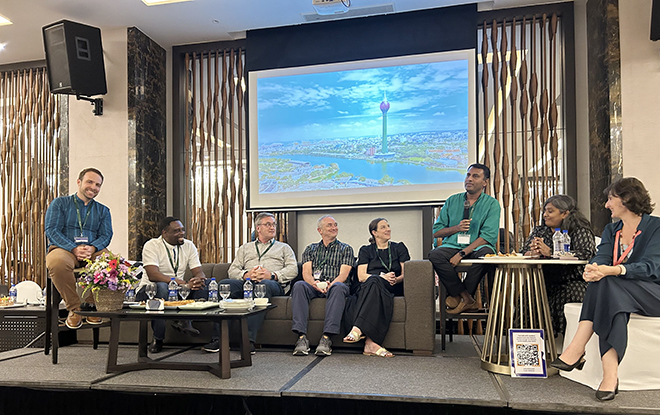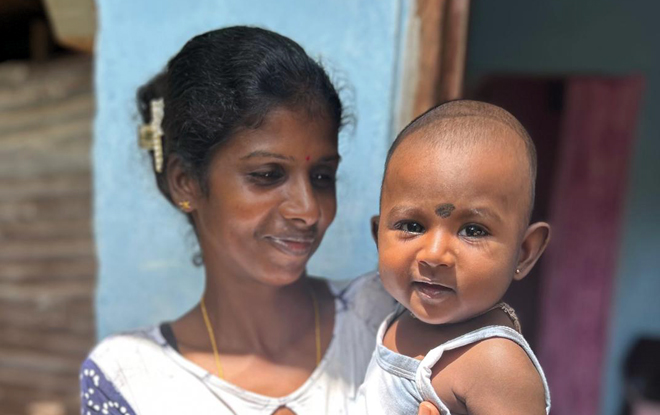Sri Lanka is a small tear-drop shaped island nation, with a complex history.
Traveling there for work, my wife Himali and I headed inland from the blue silk of the Indian Ocean to Kalutara district, where descendants of Sinhala kings and Tamil queens mingle with those of Dutch settlers and Malay traders. African Lankans, descendants of Bantu slaves brought by the Portuguese, move with the lyrical cadence that gave birth to the folk dance baila. From May to August, the Yala Monsoon drenches the south-west.

Ian and his wife Himali during their visit to Compassion Centres in Sri Lanka.
Green saturates the eye everywhere we look, a riot of creepers, coconut, tea. Wiry jungle fowl wander over well-swept earthen courtyards. A child’s rocking horse waits for its owner.
Our destination was a Compassion project that supports 116 children and their families, where we met Pastor Madendran. “I started working with Tamil tea-pickers in 1986,” he explained. Raised Hindu, his passion for Jesus now is raw, creative, and humble. He founded Gospel Tabernacle Raiygama in 1995, and in 2002, Compassion helped him enroll 100 children in the development programme.
A local paper ran an inflammatory article, accusing him of converting locals but not helping the kids. He has kept the clipping as a memento of almost insurmountable religious opposition. “The local temple demanded I give them half the money from the programme. I told them the money was for the kids, and to submit their request in writing.” They backed down.
The impact of a sponsor’s letter
Today, the project employs seven staff and ten volunteers. Children attend after-school education three times a week. There are music lessons, involvement in festivals, drug addiction awareness classes, and advocacy for child brides and their children who’ve been abandoned by men for the bright lights of the capital. There’s a cricket club, of course there’s a cricket club, in this nation where ‘infants are born cricket ball in hand’.
The children love getting letters from their overseas sponsors. Those who don’t, pray that they, too, will receive letters. These simple missives are a powerful reminder of the importance of this relationship. The kids thrive on being told that they are loved - that they matter. Many come from broken families.
Dharshika, a calm, polite 18-year-old, tells us that her sponsor is a German woman. “Sometimes, when I feel down, I pull out her letters and re-read them. I want to be a police officer. The Compassion programme has helped me find my identity and discover my talents. My Grandma, who I live with, has also started attending the community church.”
Many of the staff were once sponsor children themselves. Some grew up in Hindu households but now follow Christ. “I was helped, now I want to help others” is a common refrain. Many children plan to become Christians when they turn 18 and can legally make their own choice. Parents are often supportive. There are now 200 formerly Hindu, Christian adults in the area.

Ian and the Compassion Asia Management Team (AMT). The AMT consist of National Directors and senior team members from Compassion Indonesia, Philippines, Bangladesh, Myanmar, Thailand, Cambodia and Sri Lanka.
Faith, resilience and a brighter future
Because of Sri Lanka’s cultural landscape, the spiritual and practical parts of the programme are kept separate. What are called ‘Front-line Churches’ elsewhere are ‘Local Development Centres’ here. Across the country, 145 centres support 32,000 children, many in the formerly war-torn north and east and the tea plantations of the interior. 60% of these children are Tamil, reflecting ongoing ethnic disparities and poverty exacerbated by the pandemic, economic mismanagement, and political corruption.
Himali and I squeezed into a three-wheeler and held on tight as we sped over rutted roads and around bends to visit a family on the tea estate who are supported by Compassion. The hillsides are covered in vibrant green Camellia sinensis. A baby stared at us with bold curiosity. A shrine to Ganesh shares space with a large orange teddy bear, baby formula, and a Buddhist Vesak lantern swings gently from the ceiling.
The land under Pushpa’s home belongs to the tea plantation where her husband still works, earning US $3.50 per day, 16 days of the month. There is no unemployment benefit or social security safety net.
Before we leave, we ask her if there is anything she would like us to pray for.
“Please pray that my children will have a better life than I have had”, Pushpa replies.
“Both my older ones are sponsor children. Rather than staying at home, they like to attend the Compassion project after school. The project paid for a new roof for my house and stopped flooding. The project’s support has allowed me to stay in my own home”.

Pushpa and her young child smile for a photo outside their house in Sri Lanka.